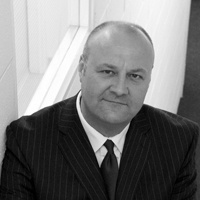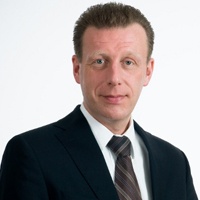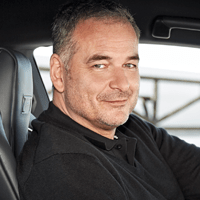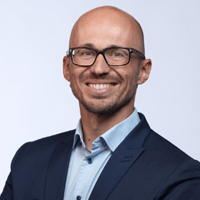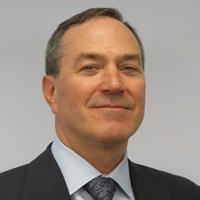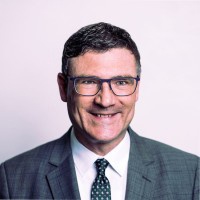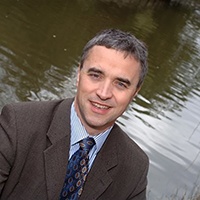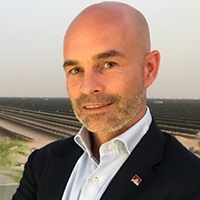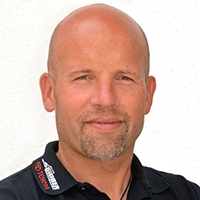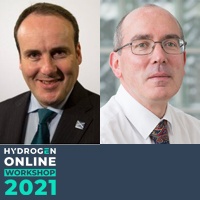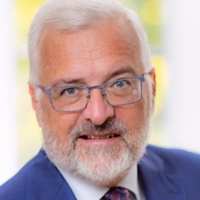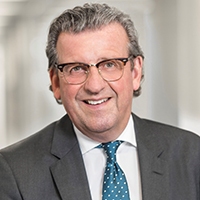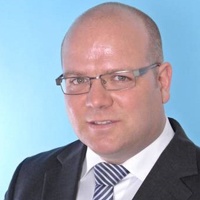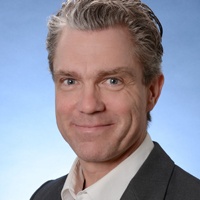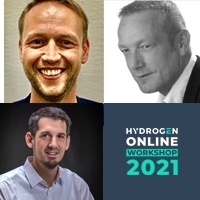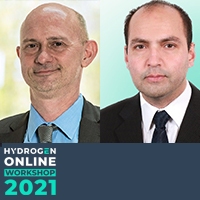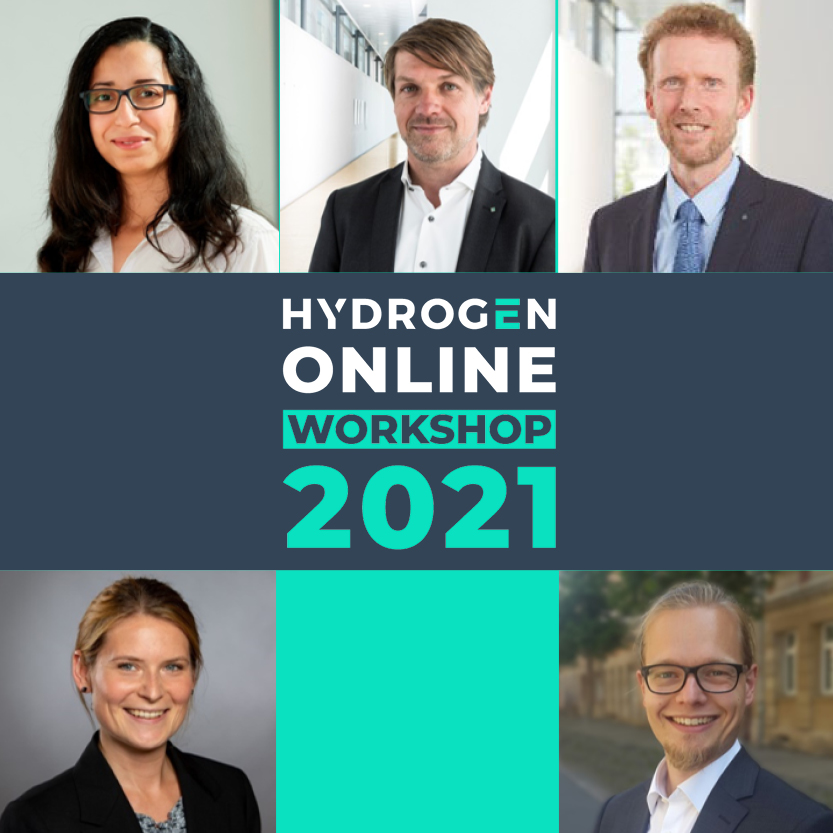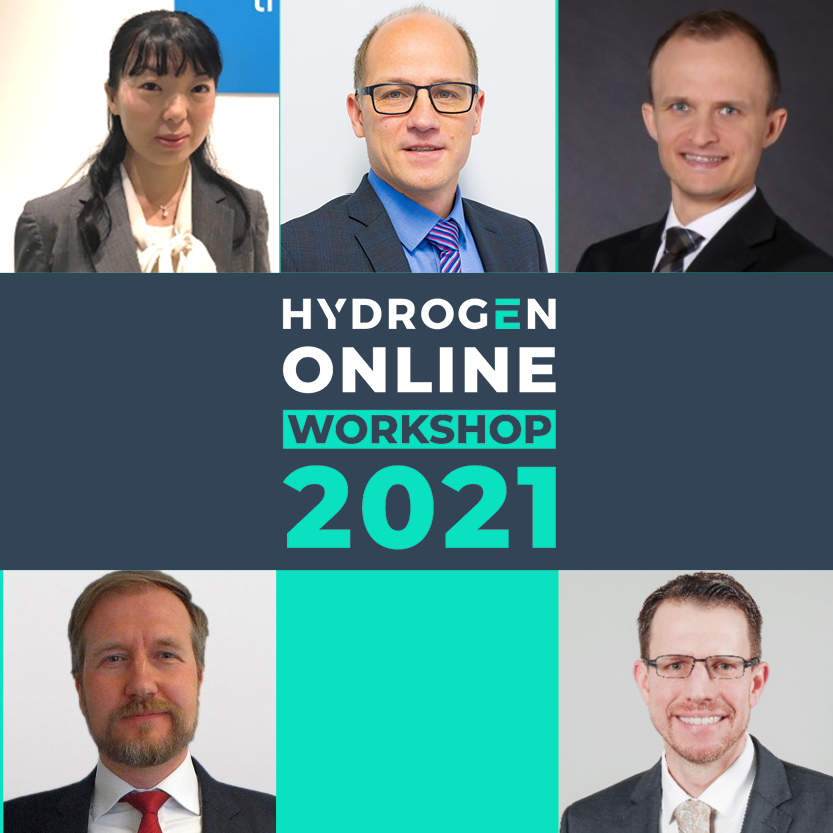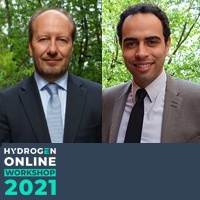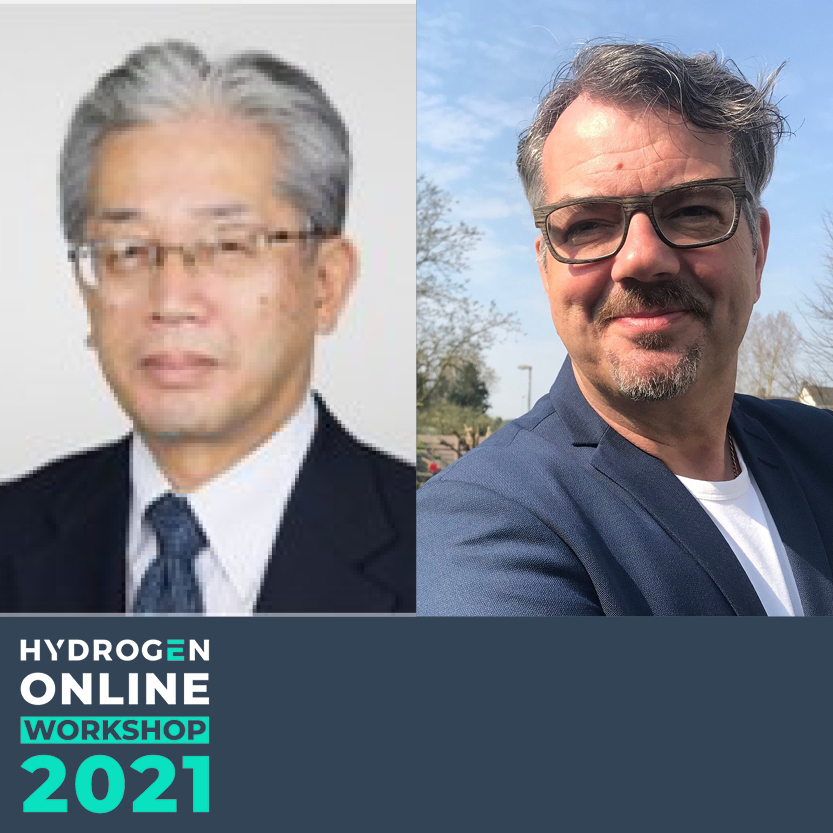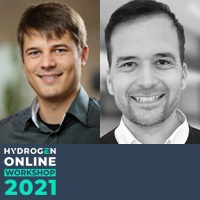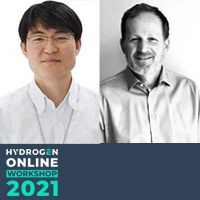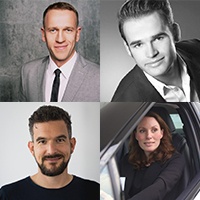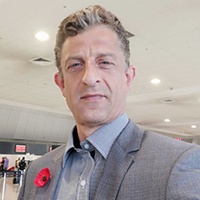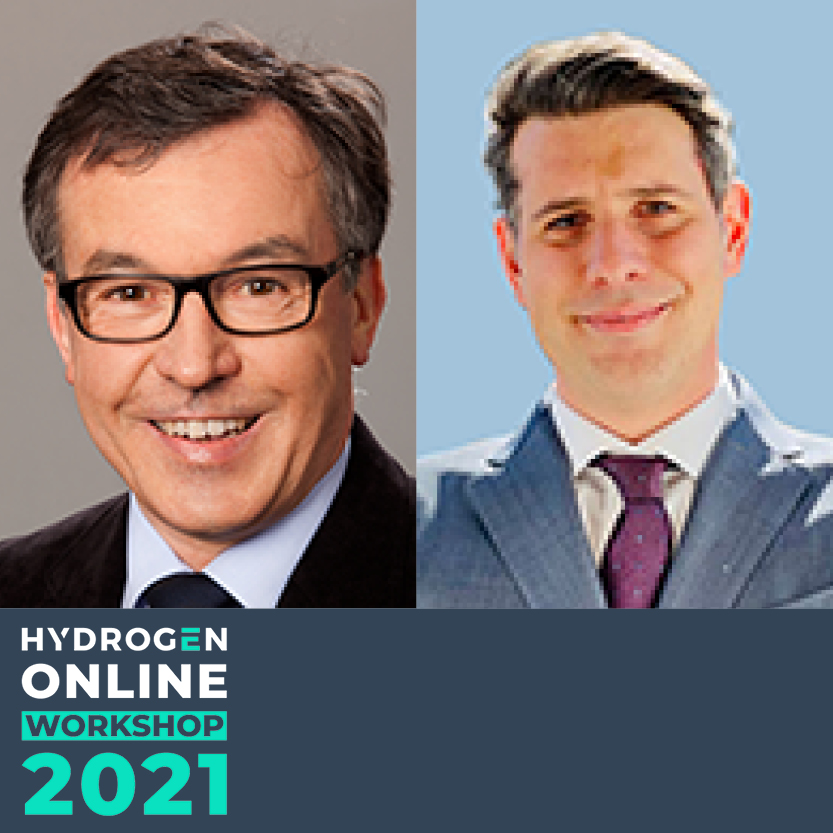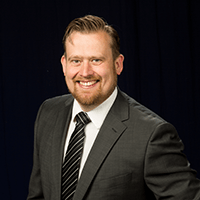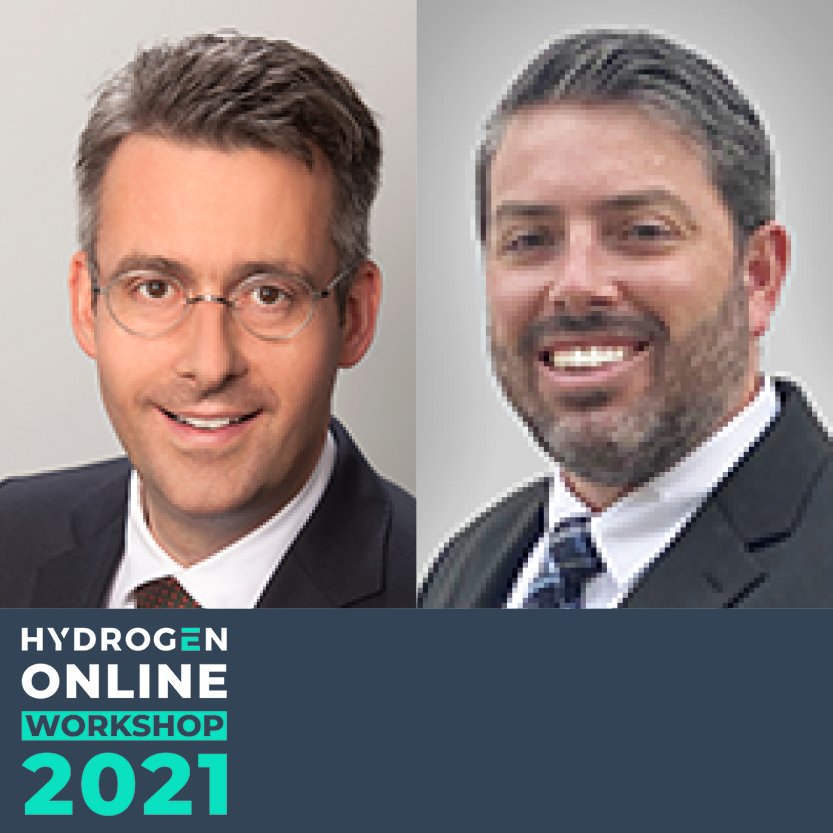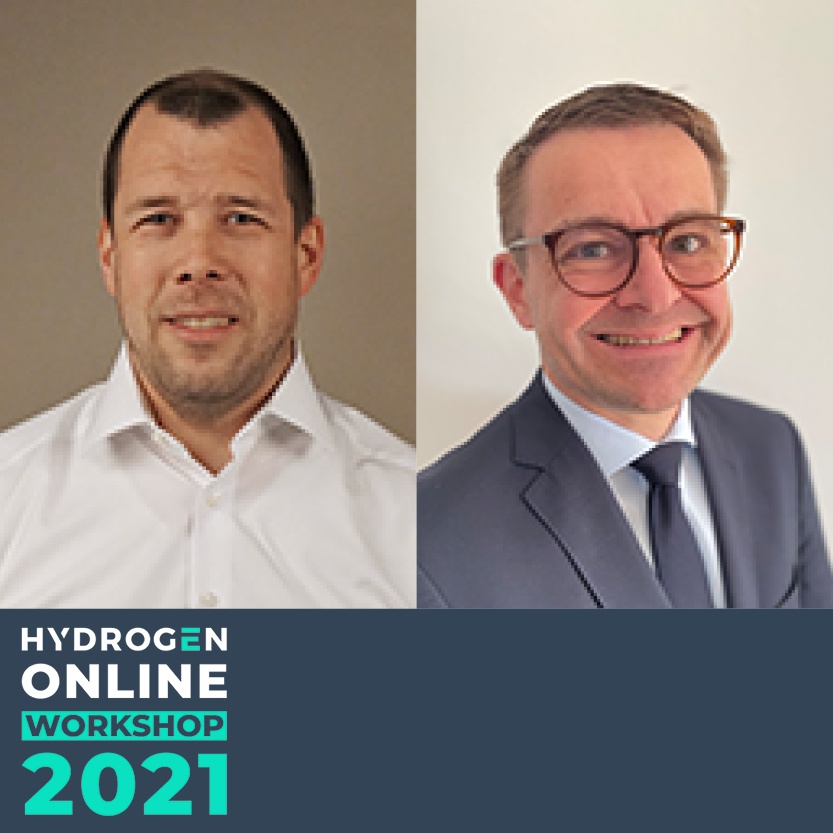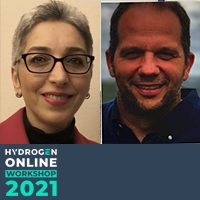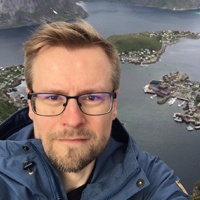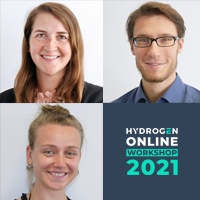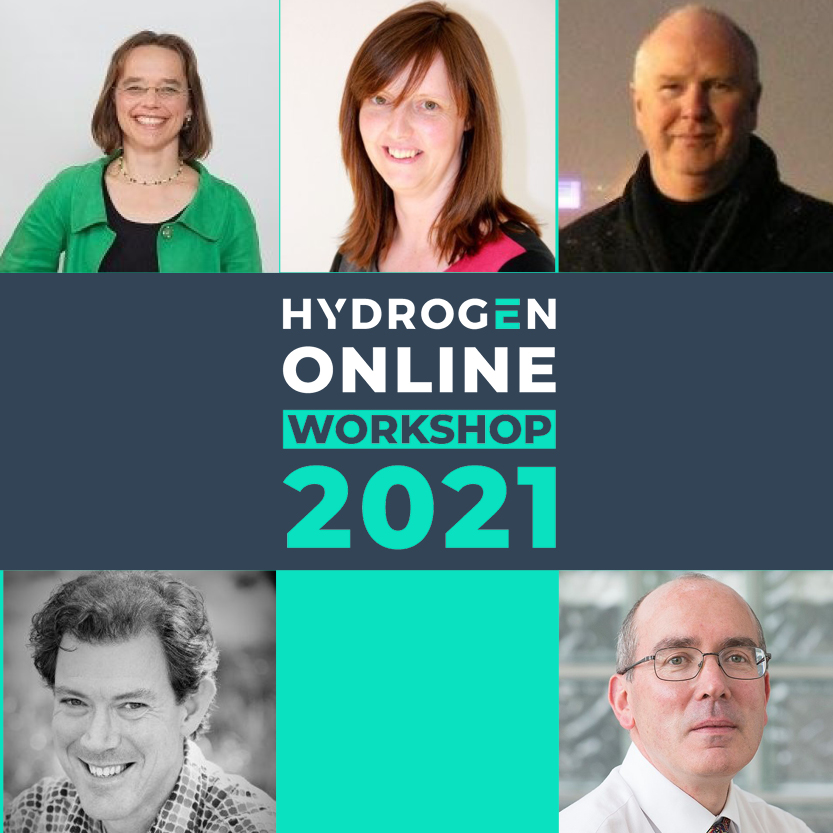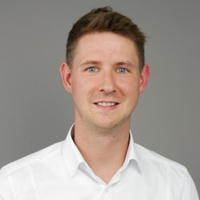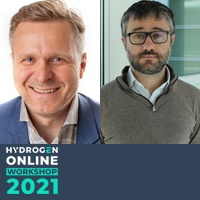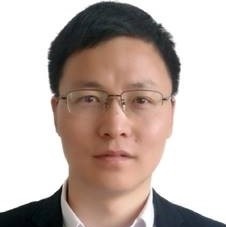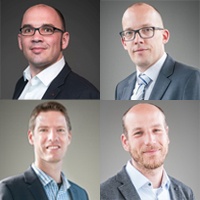HOW Collection 2021
World-class knowledge at a glance!
The Greatest Keynotes of the Hydrogen Industry
How to scale up green hydrogen production
Dr. Graham Cooley
ITM Power | CEO
How to drive down the cost of green H2 with modular electrolysers
Vaitea Cowan
Enapter GmbH | Co-founder, Head of Communications
Vaitea Cowan co-founded Enapter, which scales the production of hydrogen generators. The team has grown from 11 to over 130 in 3 years. She has the clear intention of inspiring and hiring more women. She is on the Forbes Under 30 in Energy 2020 list, and has won several awards for Enapter. Today she spearheads the communications efforts from Berlin. As a Pacific Islander, her personal mission is to provide clean energy independence to Polynesia.
How to strengthen the EU with green hydrogen – H2Global!
Werner Diwald
German Hydrogen and Fuel Cell Association DWV | Chairman of the Board
2000 – 2008 Authorized Signatory Uckerwerk Energietechnik GmbH
2008 – 2013 Executive Manager ENERTRAG HyTec GmbH (electrolyzer manufacturer)
2008 – 2013 Board Member Enertrag AG (international project development of wind parks)
Since 2013 Executive Manager PtX.Solutions GmbH
Since 2014 Chairman DWV
How to convert a carbon-neutral strategy – Toyota Environmental Challenge 2050
Ferry M. Franz
Toyota Motor Europe Group | Director of Representative Office Berlin and Hydrogen Affairs
2005 change to Toyota Deutschland GmbH in Cologne as Manager Dealer Network Development. After stations as Sales Director Lexus and General Manager Dealer Development, taking over overall responsibility for Lexus Germany. Since January 1st 2017 Director of Toyota Motor Europe Group Representative Office in Berlin, focusing on sustainable and innovative mobility (hydrogen & electric mobility, including coordinating function for France and UK), associations and politics.
How to drive zero-emission mobility
Morten Holum
Hexagon Purus AS | President & CEO
Morten Holum is President of Hexagon Purus and was appointed in December 2019. Formerly he was CEO of Saferoad Group, one of Europe’s largest road safety and road infrastructure suppliers and has held key positions in corporations such as Norske Skog, Norsk Hydro and American Airlines.
How to scale up the hydrogen fuel cell solution for transportation
Dr. Zhongjun Hou
Shanghai Hydrogen Propulsion Technology Co., Ltd. (SHPT) | Deputy General Manager
Dr. Zhongjun HOU received his doctorate in chemical engineering from the Dalian Institute of Chemical Physics, CAS, in 2003. He has been devoted to R&D and the industrialization of fuel cell technology throughout his career at both Sunrise Power and Shanghai Hydrogen Propulsion Technology. He has successfully led a series of fuel cell power system product development initiatives for vehicles.
How to build up a hydrogen infrastructure
Nikolas Iwan
H2 MOBILITY Deutschland | CEO
Nikolas has always been passionate about the energy transition and in 2016 found the perfect challenge when he took on the role of CEO of H2 MOBILITY: the JV responsible for hydrogen refueling infrastructure in Germany.
How To Stimulate Global Trade: Latest IPHE Actions on Hydrogen
Tim Karlsson
International Partnership for Hydrogen and Fuel Cells in the Economy (IPHE) | Executive Director
Tim Karlsson has been Executive Director of the International Partnership for the IPHE Secretariat since 2015. The IPHE is an inter-governmental partnership of 21 countries and the European Commission, working to help facilitate the transition to clean and efficient energy, industry and mobility systems using hydrogen and fuel cell technologies.
How to protect our climate and maintain industrial strength: green H2!
Dr. Stefan Kaufmann MdB
German Federal Ministry of Education and Research (BMBF) | Innovation Commissioner for Green Hydrogen
Dr. Stefan Kaufmann has served as Innovation Commissioner for Green Hydrogen at the Federal Ministry of Education and Research (BMBF) since June 19, 2020. The Innovation Commissioner for Green Hydrogen is a permanent guest on the State Secretaries’ Committee for Hydrogen of the participating ministries as well as the National Hydrogen Council.
How to deploy carbon-free hydrogen as fast as possible and at scale
Paul Lucchese
Hydrogen IEA Technology Collaboration Programme | Chair
Paul Lucchese is an energy engineer at the French research institute CEA. Convinced as early as 2000 that hydrogen would play a key role in the energy transition, he has devoted more than 20 years to developing hydrogen technologies at CEA and promoting international collaboration on hydrogen. This he has achieved through proactive leadership at IPHE, IEA as well as the European FCH JU which he co-funded in 2007 as chair of Hydrogen Europe Research, an organization he led for 8 years.
How to produce the cheapest green hydrogen in the world. Desertec 3.0
Cornelius Matthes
Dii Desert Energy | CEO
As the CEO at Dii Desert Energy, Cornelius has made it his mission to drive the energy transition forward and pioneer the field of energy from the desert, leading the world to 100% renewables!
How to develop the beyond-zero hydrogen building of the future
Joachim Schober
Autohaus Schober GmbH & Co. KG | CEO
Joachim Schober is a hydrogen visionary and owner of a German Toyota dealership. His ambition is to accelerate the transformation to a hydrogen society. For this reason, he developed a self-sufficient energy solution for both the car showroom and the adjoining public hydrogen filling station, a set-up in which a PV system supplies energy to the on-site combined heat and power plant. In terms of mobility concept, he compensates for the current lack of hydrogen demand and ensures an economically viable operation of the energy system which goes beyond climate neutrality. Schober will show how this works and which factors play an important role in his keynote.
How to Build a Hydrogen Economy: Faster Together with Scotland
Paul Wheelhouse MSP
Scottish Government | Minister for Energy, Connectivity and the Islands
Paul worked for 19 years in economic consultancy for public and private sector clients prior to his election in May 2011. He has previously served as Minister for Environment and Climate Change (2012-2014), Minister for Community Safety and Legal Affairs (2014-2016) and Minister for Business, Innovation and Energy (2016-2018), and prior to ministerial office was a member of the Scottish Parliament’s Finance Committee and the Parliament’s Standards Committee.
Dr. Nigel Holmes
Scottish Hydrogen and Fuel Cell Association (SHFCA) | Chief Executive
Nigel Holmes has been a member of the Scottish Hydrogen and Fuel Cell Association (SHFCA) since 2005, and became Chief Executive Officer of SHFCA in April 2011. Over the past ten years he has increased the SHFCA membership fourfold and has established SHFCA as one of the most proactive H&FC industry associations in Europe. Nigel has over 40 years of experience working in low-carbon energy generation, supply and use.
#HOW 2021 – Highlights of Part 1
Dr.-Ing. David Wenger
Mission Hydrogen GmbH | Founder
With more than 16 years of experience Wenger Engineering has completed more than 250 projects in the areas of hydrogen storage, infrastructure and hydrogen systems development in locations ranging from California to Australia.
How to Accelerate: Bold Action & Focused Support
Daryl Wilson
Hydrogen Council | Executive Director
Daryl Wilson is a versatile leader with more than 35 years of progressive industrial management experience in environmental technology, operations, manufacturing, human resources, product development and organizational change. His expertise was honed in world-class organizations, including Dofasco, Toyota and Zenon Environmental.
How to lead a traditional automotive supplier into a sustainable future
Dr. Stefan Wolf
ElringKlinger AG | Chairman of the Management Board
Dr. Stefan Wolf worked from 1994 to 1997 as a lawyer with German legal firm Thümmel, Schütze & Partner. In 1997 he joined Elring Klinger GmbH in the role of General Counsel. From 1998 to 2000 he was head of Legal Affairs and Personnel for Elring Klinger GmbH. Following the IPO of ElringKlinger AG in the year 2000, Dr. Stefan Wolf took on additional management responsibility for Investor Relations and Capital Markets. In 2004 he was appointed General Representative of the Management Board of ElringKlinger AG, in 2005 Management Board Spokesman and in 2006 Chairman of the Board. In this capacity he is responsible for Group companies, the corporate functions Business Development, Legal Affairs, Human Resources, Investor Relations and Corporate Communications, the Aftermarket division as well as Original Equipment Sales.
The Greatest Workshops of the Hydrogen Industry
How to manage & distribute large H2 volumes to mobility consumers
In this workshop, we will discuss different solutions for the distribution of hydrogen to mobility consumers, as well as gas management on site.
Thorsten Harder
Burckhardt Compression | Product Manager
How to slot-die coat electrolyzer materials
Solutions for roll-to-roll electrolyzer production in relation to coating and drying processes.
Thomas Exlager
Coatema® Coating Machinery GmbH | M.Sc. – Junior Scientist
Dr. Klaus-Peter Crone
Coatema® Coating Machinery GmbH | Senior Scientist
Thomas Kolbusch
Coatema® Coating Machinery GmbH | Vice President
How to model fuel cells and electrolyzers
Join this session to learn how to use FEM simulation to analyze and improve fuel cells and electrolyzers. See how it works in a live demonstration.
Annette Pahl
COMSOL, Inc.
How to meet the safety challenges of hydrogen
The production, storage and transportation of hydrogen carries with it particular safety risks. Managing these requires expert knowledge in all phases of the process.
Oliver Bornholdt
Dräger Safety | Global Business Development Manager Safety
How to hydrogenize future mobility
Which concepts will bring us to sustainable transport solutions using hydrogen as a fuel?
Jan Schulte
EDAG Group | Vice President of Sales and New Technologies
Johannes Barckmann
EDAG Group | Global Design Manager
Stefan Caba
EDAG Group | Project Leader Sustainable Vehicle Development
How to integrate further functionality into fuel cell stacks
During the workshop we will discuss the need for further functional integration for FC stacks.
The general approach behind these integration efforts is to reduce overall system complexity which will lead to reduced costs, higher efficiency and longer lifetimes for FC vehicles.
Dr. Stefan Dwenger
EKPO Fuel Cell Technologies GmbH | Director Product Engineering
Patrick Wilde
EKPO Fuel Cell Technologies GmbH | Head of Product Engineering Stack
Halley Hui
ElringKlinger China Ltd. | Technical Customer Manager Fuel Cell
How to integrate further functionality into fuel cell stacks
During the workshop we will discuss the need for further functional integration for FC stacks.
The general approach behind these integration efforts is to reduce overall system complexity which will lead to reduced costs, higher efficiency and longer lifetimes for FC vehicles.
Armin Diez
EKPO Fuel Cell Technologies GmbH | CTO/COO
Dr. Jürgen Kraft
EKPO Fuel Cell Technologies GmbH | Director Product Development
Stefan Hemmer
EKPO Fuel Cell Technologies GmbH | Head of Function Integration
How to generate renewable methane for large-scale hydrogen production
How does biological methanation work? Scale-up, readiness of the technology and its upsides: flexibility and use of existing infrastructure.
Dr. Doris Hafenbradl
Electrochaea GmbH | CTO and Managing Director
How to fly with hydrogen
Emission-free hydrogen propulsion system for aircraft applications. The presentation will discuss the results of the first passenger aircraft with emission-free hydrogen propulsion “HY4” following its test flights which began in November 2020. Initial results show high efficiency and reliability of the fuel cell propulsion system.
Prof. Dr.-Ing. Josef Kallo
German Aerospace Center DLR | Coordinator Energy System Integration
How to produce Hydrogen Technology Components with Laser-Based Processes
How can laser-based processes such as cutting, welding, structuring and coating provide solutions for higher functionality and productivity?
Prof. Dr.-Ing. Arnold Gillner
Fraunhofer Institute for Laser Technology ILT | Department Manager Ablation and Joining Managing Director Fraunhofer Group Light and Surfaces
Dr. rer. nat. Karsten Lange
Fraunhofer Institute for Laser Technology ILT | Project Manager
Dr.-Ing. André Häusler
Fraunhofer Institute for Laser Technology ILT | Team Leader Micro Joining Metallic Materials
How To Use Compact Hydrogen Generation Systems from Renewable Sources
Fraunhofer IMM is developing hydrogen generation systems for portable, mobile and stationary applications from renewable fuels including methanol, ammonia and synthetic hydrocarbons such as methane and blends that can serve as diesel substitutes. The fuel processor systems benefit from the high integration potential of Fraunhofer IMM reactors and its custom catalyst technology.
Prof. Dr.-Ing. Gunther Kolb
Fraunhofer Institute for Microengineering and Microsystems IMM | Deputy Director of Fraunhofer IMM and Head of Business Field Energy
Dr. Christian Bidart
Fraunhofer Institute for Microengineering and Microsystems IMM | Research Assistant
How to characterize catalysts for power-to-x processes and hydrogen storage
Dr. Siham Ouardi
Fraunhofer Institute for Solar Energy Systems ISE | Group Leader Sustainable Catalytic Materials
Dipl. Ing. Robert Szolak
Fraunhofer Institute for Solar Energy Systems ISE | Group Leader Process Development
Dr.-Ing. Achim Schaadt
Fraunhofer Institute for Solar Energy Systems ISE | Head of Department Thermochemical Processes
Dr. Monika Bosilj
Fraunhofer Institute for Solar Energy Systems ISE | Project Manager
Dipl. Ing. Florian Nestler
Fraunhofer Institute for Solar Energy Systems ISE | Project Engineer
How to Characterize Fuel Cell Membrane Electrode Assemblies
Membrane electrode assemblies are key components for fuel cell performance and durability. Understanding their behavior under various conditions is necessary for stack and system design.
Dr. Matthias Klingele
Fraunhofer Institute for Solar Energy Systems ISE | Head of Group Cell Analysis and Materials, Fuel Cell Systems, Hydrogen Technologies
How to Affordably Power Off-Grid Telecom Sites with Ammonia
GenCell unveils its innovative and resilient off-grid power solution which extracts hydrogen from liquid ammonia, now in testing at an active off-grid telecom site outside Reykjavik, Iceland.
Rami Reshef
GenCell Energy | CEO
How to Explore Cross-Border Technology Cooperation between Asia and Germany
Germany foresees significant potential for partnerships within the international hydrogen economy. Germany’s energy transition is championed by its National Hydrogen Strategy. Its ambitious target of a market-driven carbon-neutral economy is supported by 9 billion euros in government funding for green hydrogen projects. The following companies will present the framework and opportunities for international cooperation.
Dr. Namiko Murayama
thyssenkrupp Uhde Chlorine Engineers (Japan) | Group Manager of Green Hydrogen
Dr. Carsten Schmitt
thyssenkrupp Uhde Chlorine Engineers (Japan) | Representative Director & CEO
Dr. Viktor Reimer
ACTC Advanced Composite Technology Center of the HRC Group | Head of Pressure Vessel Development
Heiko Staubitz
Germany Trade and Invest | Senior Manager Investor Consulting
Robert Herzner
Germany Trade and Invest | China Director
How to strengthen the EU community with green hydrogen – H2Global!
Green hydrogen has the potential to revive the spirit of the EU. Sharing the potential of renewable energies with the economic power of industrial areas.
Werner Diwald
German Hydrogen and Fuel Cell Association DWV| Chairman of the Board
How to design serial production processes from bipolar plate to stack
In this session, we will look at the requirements and challenges of series production from two perspectives – that of the automotive supplier and that of the machine and system suppliers.
Fabian Kapp
Graebener® Bipolar Plate Technologies | Managing Director
Ulrich Schoof
LINDE + WIEMANN | Managing Director
Thomas Kuschel
thyssenkrupp Automation Engineering | Head of Sales Fuel Cell Assembly & Testing
How to build viable hydrogen business cases for low-carbon islands
H2 will be instrumental for islands as they move toward a zero-carbon economy and will open up new downstream markets and business models for renewable generators.
Frédéric Barth
Hinicio | Senior Advisor
Jean-Christophe Lanoix
Hinicio | Associate Director France
How To Advance the Development of a Honda Fuel Cell Vehicle
The Honda Clarity Fuel Cell is built on a common platform. The Honda Clarity series included next to Honda Clarity Fuel Cell also the Clarity Electric (BEV) and Clarity Plug-in Hybrid (PHEV) as Honda works to evolve and popularize electrified vehicles. Every electric vehicle on the market today has at least one barrier to overcome, whether size, affordability, range or recharging/refueling. The strategy behind the Clarity series addresses these issues through its spacious five-passenger cabin, focus on increased affordability, and expanding infrastructure.
To achieve mass-market appeal, Honda’s product development pathway aimed toward future full-scale mass production, rather than being focused on a narrow group of users.
To that end, Honda selected the “3-in-1 concept” that mounts the fuel cell powertrain under the hood like a conventional gasoline or hybrid vehicle, and realizes BEV and PHEV variants using the same platform, making Clarity the first vehicle in the industry to offer fuel cell, BEV and PHEV powertrain options on a single platform. This shared platform strategy enabled Honda to respond to infrastructure and market developments, provided customers with an zero-emission and ultra-low carbon vehicles that meet their lifestyle needs, and takes Honda toward higher volume sales of advanced powertrain products that will help to realize our dream for an zero carbon mobility future…
Takashi Moriya
Honda R&D Co., Ltd. | Executive Chief Engineer
Thomas Brachmann
Honda R&D Europe (Deutschland) GmbH | Technical Leader Energy & Digital Services Automobile Digital Solutions & Electrification Research
How to implement PEM electrolysis for producing green hydrogen
What are the requirements and success factors for implementing PEM electrolysis? With our case studies, we show applications for green hydrogen production.
Marian Hieke
H-TEC SYSTEMS GmbH | Head of Order Processing
Niclas Ege
H-TEC SYSTEMS GmbH | Sales Manager
How to provide sustainable power with hydrogen: in mobility and beyond
Hyundai dreams of a world where hydrogen fuel cells provide power to all kinds of applications. Wondering how far we’ve come and how far we are going?
Soonil Jeon
Hyundai Motor Company Fuel Cell Engineering Design Group | Vice President
Ronald Grasman
Hyundai Motor Company Fuel Cell Business Group | Vice President
How to start a career in hydrogen
An overview of potential opportunities, work environments and professions in the hydrogen field, from government & technical research to marketing, business and beyond.
Stephanie Azubike
IPHE Early Career Network | Chair
Dr. Rebecca Maserumule
Government of South Africa | Chief Director Hydrogen and Energy, Department of Science and Technology
Dr. Jacob Leachman
School of Mechanical and Materials Engineering at Washington State University (WSU) | Associate Professor
Mirela Atanasiu
FCH JU | Head of Unit of Operations and Communication in the Fuel Cells and Hydrogen Joint Undertaking
Dr. Shuk Han Chan
Hawaiian Electric (HECO) | Energy Analytics Scientist
How to build a hydrogen refuelling station
Hydrogen is a true all-rounder: the smallest element in our universe moves cars, buses, small and large commercial vehicles or even trains. The necessary filling stations vary – they are public or located in a depot, integrated into existing filling stations or stand alone solutions. They store a few hundred kilograms or a few tons, under pressure or cryogenic. With more than 60 construction projects and with the operation of over 90 stations H2 MOBILITY Germany has gained a lot of experience – knowledge that we share with third parties. Our workshop offers a first insight into scoping, planning, construction and operation of hydrogen Refuelling stations.
Lorenz Jung
Falk Schulte-Wintrop
Benjamin Jödecke
Sybille Riepe
How to design renewable hydrogen plants
Providing a broad overview and discussing base considerations and core elements in the design of renewable hydrogen plants.
Luigi Bonadio
Noel Dunlop
How to optimise your Hydrogen Fuel Storage System design, with Luxfer
Developing advanced hydrogen fuel systems for a wide range of transport modes
Alok Maskara
Luxfer Gas Cylinders | CEO
Keith Croysdale
Luxfer Gas Cylinders | Business Development Manager
Jim Gregory
Luxfer Gas Cylinders | European Business Development Manager, AF
How to select the hydrogen tank solution? – Materials and Technologies
This workshop shows current designs and manufacturing technologies for H2 pressure tanks and gives hints for material- and industry-specific use.
Kai Steinbach
LZS GmbH | Head of Engineering
How to manage cost efficiency of turned parts and assemblies for hydrogen
What’s needed in design of turned components to reach the cost targets in scale up of hydrogen business
Dr. Max Mehring
Mesa Parts GmbH | Head of Research and Development
Patrick Braun
Mesa Parts GmbH | Development Engineer
Raphael Wunderle
Mesa Parts GmbH | Development Engineer
How to design an efficient hydrogen leak detection system
Join our workshop where we’ll show how to design a layered Hydrogen Fire and Gas detection system and mitigate the risks on your plant or solution.
Claudio Fecarotta
MSA – The Safety Company | Business Development Manager
Marc Syguda
MSA – The Safety Company | Sales Engineer
Jerome Bouyon
MSA – The Safety Company | Hydrogen Key Account Manager
How to decide which form of hydrogen to use (liquid vs. gaseous)?
A factual comparison of the two basic ways to store and transport hydrogen.
Jos Dieteren
NEUMAN & ESSER GROUP | Area Sales Manager
Andrea Fragonara
NEUMAN & ESSER GROUP | Area Sales Manager – South Europe & North Africa
How to optimize the hydrogen value chain from generation to end-user?
A virtual pipeline showcase – the system impact of atmospheric or pressurized electrolyzers, 300 or 500 bar trailers?
Jens Wulff
NEUMAN & ESSER GROUP | Managing Director Operations
How to scale up high pressure compression – goal: 500 bar+?
Fuel Cell mobility conform compressor solutions for HRSs, trailer filling and virtual pipelines – Hydraulic Piston, Diaphragm and Non-lube Piston.
Prof. Dr. Klaus Hoff
NEUMAN & ESSER GROUP | Managing Director
Patrick McCalley
NEUMAN & ESSER GROUP | Sales Manager
How to optimize the availability of your Hydrogen process equipment?
IoT and Analytics – Condition management of your equipment to get the sustainable maximum out of your equipment.
Stefan Damberg
NEUMAN & ESSER GROUP | Department Manager Spare Parts & Service
Ulrich Garde
NEUMAN & ESSER GROUP | Manager Sales & Business Development
How to locate hydrogen gas leak locations with Nitto H2 detection tape
Nitto offers a proactive safety tool to help quickly identify hydrogen gas leak locations utilizing Nitto’s Hydrogen Detection Tape
Dr. Nahid Mohajeri
NITTO Belgium NV | Advanced Polymer Technology General Manager – AREA Development
Paul Bieghs
NITTO Belgium NV | General Manager Semicom and Marcom
How to implement hydrogen as energy carrier in maritime energy systems? (NTNU 1/2)
Challenges and possible solutions for making Hydrogen an alternative maritime fuel. Are experiences with LNG relevant for Hydrogen systems?
Ann Rigmor Nerheim
How to design new catalyst materials for HER in silico? (NTNU 2/2)
We have develop a modelling platform which enables materials screening of potential catalyst materials by incorporating DFT simulations and machine learning algorithms.
Prof. Jaakko Akola
Norwegian University of Science and Technology (NTNU)| Department of Physics
How to benefit from German regulatory framework in Hydrogen projects
In Germany, the economics of on-site electrolyser projects relies heavily on their individual settings. Hydrogen projects can benefit from reduced renewable surcharges, or they are eligable for reduced grid connection fees. In this workshop, we talk about the different cost aspects of electrolyser projects and their regulatory framework.
Dr. Kathrin Goldammer
Reiner Lemoine Institut gGmbH | Managing Director
Norman Pieniak
Reiner Lemoine Institut gGmbH | Head of mobility-department
Laura Wienpahl
Reiner Lemoine Institut gGmbH | Researcher
How to Build a Hydrogen Economy: Building Hydrogen Clusters with Scotland
There is significant focus on the scaling up of hydrogen supply, but without the corresponding scale of hydrogen demand there is no solid business case for hydrogen projects. This workshop explores approaches being used Scotland to help overcome the ‘chicken or egg’ dilemma, and which may also support the development of viable green hydrogen clusters without massive public sector subsidy.
Alexandra Stein
Scottish Government Berlin Hub
Paul O’Brien
Highlands & Islands Enterprise
Joanne Allday
Port of Cromarty Firth
Tim Dumenil
Pale Blue Dot
Nigel Holmes
Scottish Hydrogen and Fuel Cell Association
How to meet the requirements of the transportation industry
The aim of the workshop is to identify the requirements and expectations of the transportation concerning Hydrogene vehicles and infrastructure. Manager of transportation companies are asked to describe what they need and what they want. The outcome is crucial to truck manufactures, fuelling companies and truck stop operators.
Prof. Dr. Manfred Loidold
RheinMain University of Applied Sciences | Professor of Geographic Information Technologies
How to develop H2 hoses for the heavy-duty industry
This workshop discusses about existing and future challenges for Hydrogen hoses regarding standards, connections, applications, etc.
Markus Eberle
SPIR STAR ® AG | H2 Specialist – Technical Sales
Tobias Schmiedl
SPIR STAR ® AG | H2 Specialist – Engineering
How to refuel a Hydrogen bus
This workshop addresses typical challenges of 350bar hydrogen bus refueling, such as fueling speed, pressure drop and necessary precooling.
Manfred Greisel
Wenger Engineering GmbH | CTO
How to ensure the quality of hydrogen fuel dispensed from HRS?
This workshop discusses standard procedures for sampling hydrogen from HRS currently being developed (ISO/WD 19880-9). In relation, H2 fuel quality data and analysis are presented
Thor Anders Aarhaug
SINTEF Industry | Senior Research Scientist
Thomas Bacquart
National Physical Laboratory (NPL) | Senior Research Scientist
How to build profitable fueling business – Green Hydrogen from Biogas
On-site hydrogen production at only 10% of the biogas plants in Germany meets the entire demand of street based public transport. Let’s go for it.
Dr.-Ing. Hans-Peter Schmid
WS Reformer GmbH, Renningen, Germany | Managing Director
Dr.-Ing. Andreas Gradel
Btx energy GmbH, Hof, Germany | Scientific Assistant
How to design an excellent Chinese Type IV Hydrogen tank
Meeting the booming Chinese market: As high weight, fatigue and low-cost performance required for vehicle hydrogen storage, we had recognized a promising market of Type IV hydrogen tank in China next decade. Meanwhile, we will discuss the design steps and design key points of Type IV hydrogen tank with you.
Weng Yiming
YAPP Automotive Systems Co., Ltd. | Technical Expert
How to design the PEM fuel cell anode supply
In this workshop, topics related to the bipolar plates, materials and simulations of the anode circuit and also Hydrogen quality and Hydrogen analysis will be addressed.
Dr.-Ing. Jörg Karstedt
ZBT – THE HYDROGEN AND FUEL CELL CENTER | Head of Department Fuel Cells and Stacks
Dr.-Ing. Christian Spitta
ZBT – THE HYDROGEN AND FUEL CELL CENTER | Head of Department Hydrogen Infrastructure
Dr.-Ing. Ulrich Misz
ZBT – THE HYDROGEN AND FUEL CELL CENTER | Head of Department Fuel Cell Systems
Dr.-Ing. Sönke Gößling
ZBT – THE HYDROGEN AND FUEL CELL CENTER | Group Leader Simulations and Controls

